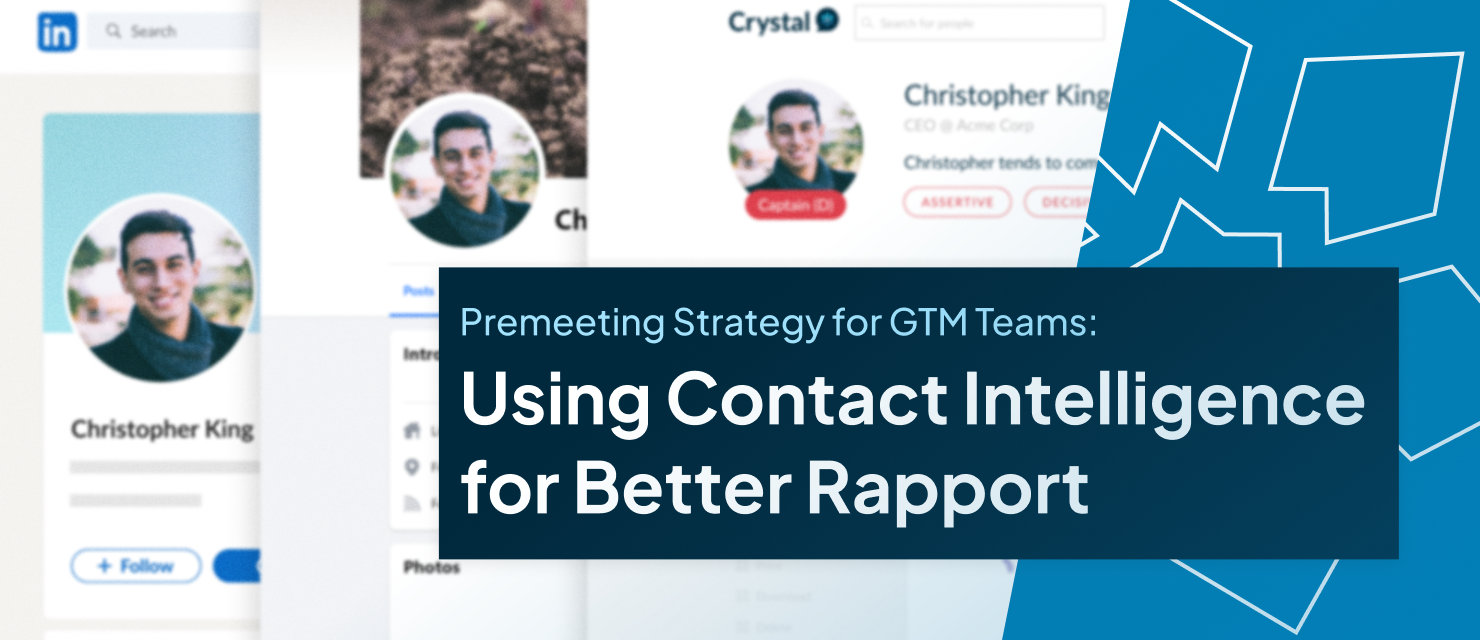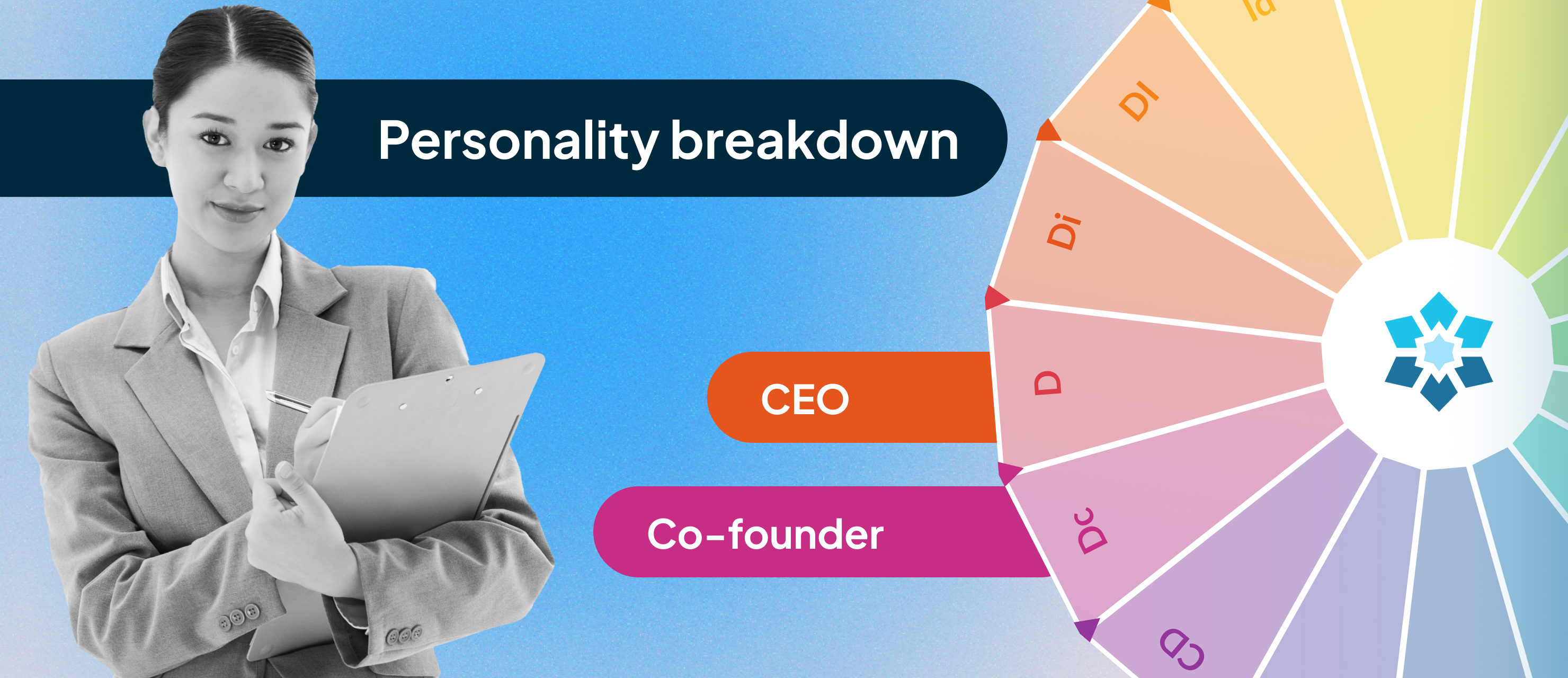
The difference between a closed deal and a missed opportunity often hinges on one crucial factor: Preparation.
For go-to-market (GTM) teams, this preparation is no longer just a matter of reviewing basic company information or rehearsing a generic pitch.
The key to success lies in understanding the individuals behind their titles — like their motivations, expected behavior, and priorities. And that’s what contact intelligence is all about, transforming an ordinary sales interaction into a personalized, meaningful conversation that resonates with the prospect.
As we move forward with Ingredient #1 of our series on pre-meeting research, make sure to start the series from the beginning with our first article on being the most prepared in every room!
What Is Contact Intelligence, and Why Is It Important?
Contact intelligence refers to the comprehensive set of information and insights about an individual prospect that can be leveraged to create more personalized and effective sales interactions.
This intelligence encompasses a wide range of data points, including:
- Location
- Education
- Professional background
- Priorities and goals
- Quotes and media appearances
- Communication preferences
- Personality traits
- Expected behaviors
- Mutual connections
Contact intelligence allows you to tailor your approach to match a prospect's specific needs, preferences, and communication style.
For example, understanding a prospect's professional background and priorities can help you highlight the most relevant benefits of your product or service. Conversely, understanding their personality traits and communication preferences can help you adapt your tone and messaging to create a more engaging and persuasive dialogue.
Understanding the Individual
In the realm of contact intelligence, moving beyond basic information is crucial. While knowing a prospect's title, company, and contact details is important, it's just the tip of the iceberg.
To truly connect with an individual, you need to delve deeper into their background, motivations, expected behaviors, and priorities. For instance, discovering that a prospect is passionate about environmental sustainability can help you tailor your conversation to highlight how your solution aligns with their values.
By demonstrating a genuine understanding of who they are and what drives them, you lay the foundation for a more meaningful and impactful dialogue.
This level of insight allows you to position your offering not just as a product or service but as a vehicle for achieving their goals and aspirations. When you take the time to understand the person and what’s meaningful to them, you unlock the power to create a truly resonant and memorable interaction.
Build Rapport and Trust
Building rapport and trust is necessary for any sales interaction, and having contact intelligence is a powerful way to achieve this. By demonstrating genuine interest in the prospect as an individual, you create an atmosphere of authenticity and connection. After all, you’re more likely to do business with someone you like and trust.
For example, if you discover that you and the prospect attended the same university or have a mutual acquaintance, mentioning this shared experience can help break the ice and establish common ground.
These personal touches show that you've taken the time to learn about them. Similarly, if you uncover that the prospect has recently achieved a significant milestone or has been recognized for their work, acknowledging and congratulating them on their success can further strengthen the bond between you.
Additionally, quotes and media appearances can also serve as excellent conversation starters. By referencing a prospect's recent interview or publication, you demonstrate that you've done your research and are genuinely interested in their insights and expertise. Not to mention, it shows you value their perspective, providing an opportunity to engage in meaningful dialogue.
When you use contact intelligence to build rapport and trust, you create a solid foundation for a productive and fruitful business relationship.
Tailoring the Approach
One of the most significant benefits of contact intelligence is the ability to tailor your approach to each individual. By understanding a prospect's communication preferences and decision-making processes, you can adapt your messaging and presentation style to resonate with them more effectively. People are different, and they want to be sold to differently.
For example, when engaging with an analytical prospect who values data-driven insights, you might focus on presenting quantitative evidence and case studies that demonstrate the tangible impact of your solution.
On the other hand, when interacting with a visionary thinker who is more interested in the big picture, you may want to emphasize the transformative potential of your offering and tell it through a compelling story.
By tailoring your approach based on the individual's preferences and style, it sets you apart from generic, one-size-fits-all sales pitches that they are accustomed to receiving.
This personalized approach not only increases the likelihood of a successful outcome but also lays the groundwork for a more meaningful and lasting business relationship.
Anticipating Needs and Concerns
Contact intelligence also enables you to proactively address potential objections or challenges that a prospect may face. By researching their role, industry, and current priorities, you can demonstrate a deep understanding of their situation and offer relevant solutions.
Let’s look at an example:
If you discover that a prospect is grappling with a specific industry-wide issue, you can come prepared with case studies or examples of how your solution has helped similar companies overcome that challenge.
This level of preparation shows that you've done your homework and are genuinely invested in helping them succeed. By anticipating their needs and concerns, you can guide the conversation in a direction that highlights the unique value your solution brings to the table.
This proactive approach not only saves time by addressing potential roadblocks upfront but also reinforces your position as a knowledgeable and trusted partner. It also reframes your product as the only solution in the prospect’s mind — and not your competitors. When you use contact intelligence to anticipate needs and concerns, you demonstrate a level of expertise and commitment that sets you apart from the competition.
The Best Places to Find Advanced Contact Intelligence
Here are the five best places to find contact intelligence:
Crystal
Crystal is a unique platform that provides personality-based insights to help you communicate more effectively with prospects. By analyzing a prospect's online presence, Crystal can identify their personality type and communication style and even provide tailored advice on how to build rapport and influence them.
This level of personality intelligence can be incredibly valuable in sales, as it allows you to adapt your approach to match the prospect's preferences and increase the likelihood of a positive outcome. It’s a new level of contact intelligence by leveraging data that was previously untapped.
LinkedIn is a goldmine for contact intelligence. Beyond basic information like job titles and work history, LinkedIn profiles often include valuable insights into a prospect's educational background, professional certifications, and even personal interests.
By exploring a prospect's LinkedIn activity, such as their posts, comments, and group memberships, you can gain a deeper understanding of their priorities, opinions, and industry involvement.
Other Social Media Platforms
In addition to LinkedIn, other social media platforms can provide valuable contact intelligence. Platforms like Twitter, Facebook, and Instagram can offer insights into a prospect's interests, opinions, and personal life. By following a prospect's social media activity, you can identify common ground, shared connections, and even conversation starters.
For example, if a prospect frequently posts about a particular hobby or cause, you can use that information to build rapport and demonstrate your genuine interest in them as a person.
CRM
Your company's CRM (Customer Relationship Management) system can be a valuable source of contact intelligence. CRMs often contain detailed records of previous interactions, notes, and even personal details that have been collected over time.
This data can help refresh your memory on past conversations you’ve had with a prospect, allowing you to connect with them on a more personal level without repeating information.
Data Platforms (i.e. Apollo.io, ZoomInfo, KnowledgeNet.ai, etc.)
Data platforms like Apollo.io, ZoomInfo, and KnowledgeNet.ai are powerful tools for uncovering advanced contact intelligence because of how they aggregate information. Typically, they include public records, social media, and proprietary databases to provide comprehensive profiles of individual prospects.
With features like email verification, direct dial phone numbers, and even predictive insights, these platforms can help you connect with prospects more efficiently and effectively.
Elevate Your Pre-Meeting Strategy
Contact intelligence is what gives you control over your sales calls. It’s about building personal relationships, helping customers overcome limiting beliefs, and giving you the power to guide the entire call.
It transforms the sales process from a transactional, one-size-fits-all approach to a collaborative, value-driven partnership. By leveraging the power of contact intelligence, GTM teams can not only close more deals but also build lasting relationships that lead to long-term success.
Crystal’s latest service provides all the information you need in one place, so you can focus on building relationships and driving results.
Ready to elevate your pre-meeting strategy? Join our beta at premeeting.com to learn more. With Crystal's pre-meeting emails, you'll never walk into a meeting unprepared again.


















